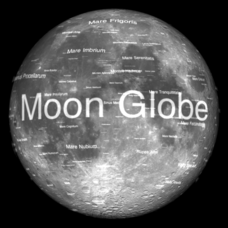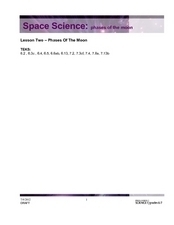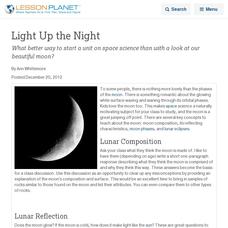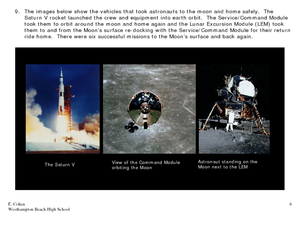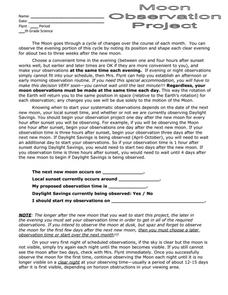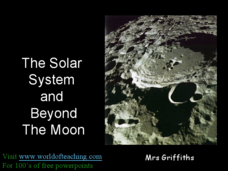Scholastic
Study Jams! The Moon
Take your class to the moon and back with this compact slide show. A mix of computer-generated images and photographs are supported by explanatory text. Observers learn about the moon's movements, its physical features, and its phases....
Midnight Martian
Moon Globe
Not just a simple globe of the moon, this interactive version allows you to choose lighting according to the location of the sun, views from different positions on Earth, and more! Satellite images and topographic data have been combined...
Curated OER
Space Science: Phases of the Moon
Looking for a terrific instructional activity on the phases of the moon that has lots of good worksheets? With two excellent websites are embedded in the plan, the activity is sure to spark some interest in your astronomy unit. Some...
Curated OER
Return to the Moon
Students react to statements about space exploration, then read a news article about plans to resume manned flights to the moon. In this space science and current events instructional activity, the teacher introduces the article with a...
Curated OER
Walk Two Moons: The Lunatic Mystery Case Book
Here’s the meatball in the bowl of spaghetti. Readers build a Lunatic Mystery Case Book, collecting evidence to support their prediction about the identity of the lunatic in Walk Two Moons, Sharon Creech’s Newbery Medal winning novel....
Lunar and Planetary Institute
Oreo Moon Phases
Learning about the moon has never tasted delicious! Using the popular Oreo cookie as a model, young scientists carve out the cream filling to represent the different phases of the moon.
Lunar and Planetary Institute
Moon Flip Book
Watch an entire month flash before your eyes with this fun phases-of-the-moon flip book activity.
California Academy of Science
Kinesthetic Astronomy: Moon Phases
We are the world! Each of your class members models Earth and holds a styrofoam ball to see its phases. Thorough teacher background information and a detailed lesson plan will make this a cinch to teach. If you do not want to purchase...
Holland Patent Central School District
Moon Phases
Kids are fascinated by the moon for good reason! Here's a great resource to help them chart the lunar cycle for a month, referencing high-detail photographs and an informative chart as they complete their own calendar.
Curated OER
The Sun, Moon, and Our Solar System: Teacher/Student Notes
Introduce basic Earth and space science to your budding astronauts. This handout works in two ways, the first part provides information about the sun, moon, eclipses, and Earth to be read to or by the class. The second part is composed...
Mr. Hill's Science Website
Identifying Phases of the Moon
Is that a waxing crescent or waning gibbous moon? Here's a comprehensive set of worksheets complete with great visuals that will have your kids spouting off the lunar cycle in order!
University of Texas
Observing the Moon
Why does it look like there is a man on the moon? Why does the moon look different every night? These are the focus questions of a lesson that prompts class members to observe and record the nightly changes of Earth's natural...
Curated OER
Moon Mining
Go on a moon mining expedition from the safety of your classroom with this space exploration simulation. Using simple models of the moon's surface prepared ahead of time by the teacher, young scientists are challenged with locating and...
Science 4 Inquiry
Phases of the Moon
The moon takes just over 27 days to orbit around Earth. Young scientists position themselves as the earth as they rotate around the sun and hold the moon. This allows them to observe the patterns and phases of the moon.
American Museum of Natural History
Moon Flip Book
Flip over the phases of the moon. Using an interactive, pupils view the location of the moon relative to the sun and earth for the eight major phases of the moon. Individuals record how the moon looks through a complete cycle. Using...
Curated OER
Phases of the Moon
Sixth graders learn that the moon orbits the Earth in a predictable cycle. Each learner engages in a two-week observation of the moon. They sketch its appearance, and take note of its position in relation to objects in their yard. Some...
Curated OER
Excite the Night with a Look at the Moon
What better way to start a unit on space science than with a look at our beautiful moon?
Space Awareness
Sun, Earth and Moon Model
The moon orbits Earth while the Earth is rotating, and the Earth revolves around the sun. This can be a tricky concept for young astronomers. Implement an activity that helps distinguish between the movements of Earth's systems around...
Curated OER
Oreo Moon Phases.
A guide to recreating all the phases of the moon out of Oreo cookies with varying amounts of cream filling. Although a simple activity, there are more involved questions requiring moon cycle and phase comprehension and leading...
School World
Moon Observation Project
Mrs. Flynt has designed a 12-day moon observation activity that is best assigned when daylight hours are shorter. Middle school moon experts record several factors, including the altitude above the horizon, the azimuth, the phase, and...
Curated OER
Phases of the Moon
Here is a nice presentation on the ways to determine the phase, and the name of the phase of all the phases of the moon. For example, one slide shows the moon exactly half lit, with the light on the right hand side. This is the First...
CK-12 Foundation
Phases of the Moon
The sun can tell us what time it is with a sun dial, but can the moon do the same? Scholars play with a simulation of the phases of the moon. They control the type of moon and time of day in order to see when the sun is up and when the...
Curated OER
The Solar System and Beyond: The Moon
Here is a very basic look at the moon and its positioning around our planet. The pictures and labels here show different phases and will help your space explorers understand our changing views of the moon along with the Earth's tilt and...
Center for Math and Science Education
Stackable Moon Phases
Observe the phases of the moon with this stackable moon phases model. Here, super scientists create the phases of the moon by cutting, coloring, and attaching pieces in the order in which the moon changes.
Other popular searches
- The Moon and Tides
- The Moon Landing
- Comparing the Moon and Sun
- Man on the Moon Video
- The Moon Phases
- The Moon Is Down
- Science the Moon Orbit
- The Moon Tides
- The Sun Earth Moon System
- Phases of the Moon Journal
- Moon and the Earth
- How the Earth and Moon Compare



